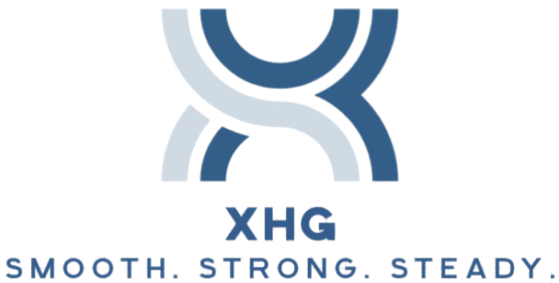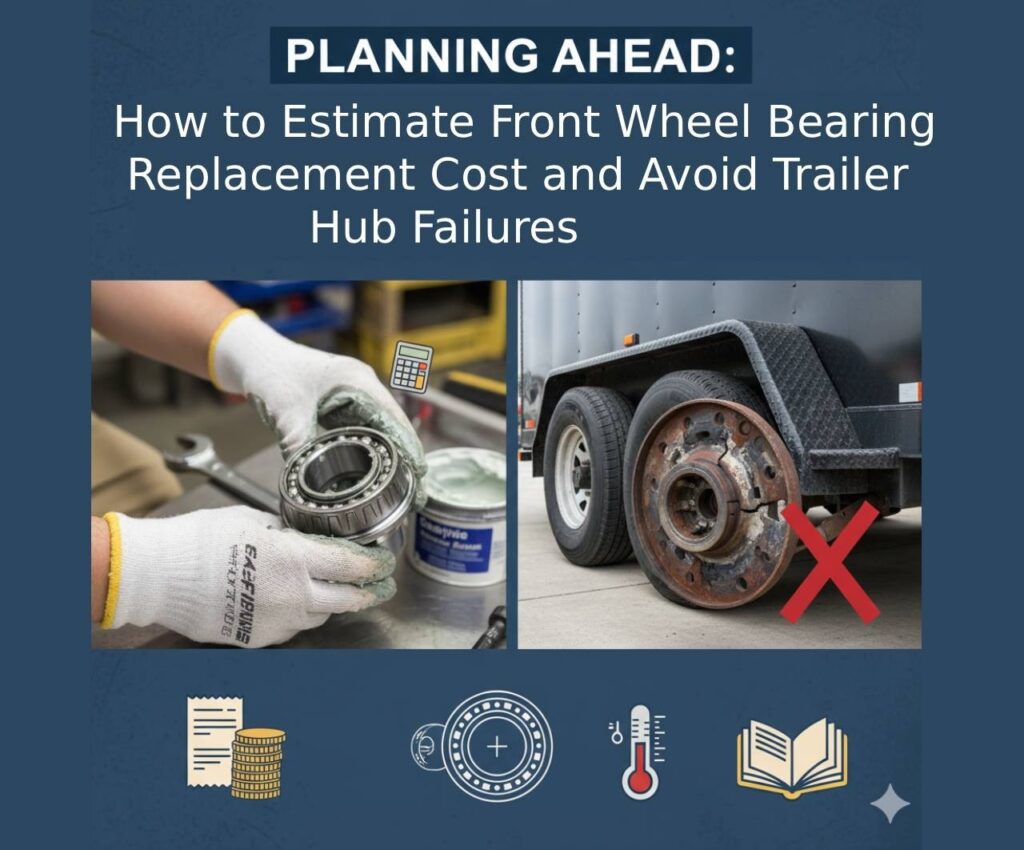Whether you’re managing a fleet of delivery vehicles or maintaining a utility hauler, understanding the front wheel bearing replacement cost is essential to keeping your equipment running smoothly. And if you’re working with trailers, the stakes are just as high. A worn trailer wheel bearing can lead to overheating, axle damage, or catastrophic hub failure. Knowing when—and how—to replace your hub and bearing assembly not only protects your equipment but also helps you budget smartly and avoid unexpected repair bills.
In this guide, we’ll explore the typical front wheel bearing replacement cost, walk you through how to prevent trailer wheel bearing failures, and show you how smart planning around the hub and bearing assembly can extend vehicle lifespan, reduce downtime, and improve overall safety. Know More
Why Front and Trailer Bearings Matter
Wheel bearings are the unsung heroes of your vehicle or trailer’s suspension and drive systems. Housed within the hub and bearing assembly, they reduce friction and support the vehicle’s weight as the wheels spin. But bearings aren’t immortal. Over time, they degrade due to heat, moisture, load, and contamination.
If you’re not regularly inspecting or replacing your trailer wheel bearing or front wheel units, you risk major failures—many of which come with high repair costs and safety concerns.
What Does Front Wheel Bearing Replacement Cost?
The front wheel bearing replacement cost can vary dramatically depending on the type of vehicle, location, and whether you’re doing it yourself or hiring a professional mechanic.
1. DIY Replacement Cost
- Parts: $40–$150 per hub and bearing assembly
- Tools: Torque wrench, jack stands, breaker bar, axle socket (if not already owned)
- Total DIY Cost: ~$80–$200
2. Professional Service
- Labor: $150–$300 (depends on vehicle complexity and location)
- Parts: $80–$250 for quality assemblies
- Shop Fees & Taxes: ~$20–$50
- Total Professional Cost: $250–$600+
Tip: AWD or 4WD systems usually cost more due to added disassembly of axle components.
By comparing these figures, you can prepare your budget accordingly and prevent cost surprises. For trailers, costs tend to be lower but follow a similar trend.
Trailer Wheel Bearing: What’s at Stake?
A faulty trailer wheel bearing isn’t just a minor inconvenience—it can lead to catastrophic failures like seized hubs, broken axles, or even lost wheels while in motion. This is why regular inspection and greasing are vital, especially if your trailer hauls heavy loads or is frequently submerged (boat trailers).
Signs of a Failing Trailer Wheel Bearing:
- Excessive wheel play or wobble
- Grinding or humming noise while towing
- Hot hub after short trips
- Grease leaking from the hub cap
Typical Cost for Trailer Wheel Bearing Replacement:
- DIY: $20–$60 per wheel
- Shop Replacement: $100–$250 per axle
- Bearing Kit with Grease Seals and Races: $30–$90
Staying on top of trailer wheel bearing health is not just a cost-saving strategy—it’s a critical part of safe towing.
Hub and Bearing Assembly: What You’re Really Paying For
Modern vehicles and trailers typically use a hub and bearing assembly—a sealed unit that integrates the bearing, hub flange, and often the ABS sensor. This setup simplifies installation but means the entire unit must be replaced when worn.
What You Get in a Quality Hub and Bearing Assembly:
- Pre-greased, sealed bearing for zero-maintenance
- Precision-machined races and steel ball or roller bearings
- ABS sensor ring or integrated encoder (for newer vehicles)
- Durable flange with bolt holes aligned to OEM specs
Because the hub and bearing assembly is non-serviceable, it’s crucial to choose a reliable, OEM-grade product to ensure long-term performance.
Budgeting Tips: How to Minimize Front Wheel Bearing Replacement Cost
Replacing a hub and bearing assembly doesn’t have to break the bank. Here are smart strategies to keep your costs down and quality up.
1. Buy Wholesale or OEM-Equivalent Parts
As a wholesaler or bulk buyer, you can cut per-unit costs by 30–50%. Choose ISO-certified or Tier-1 manufacturers for reliability.
2. Replace in Pairs
If one bearing has failed, the other is often close behind. Replacing both front (or rear) bearings at once prevents uneven wear and saves future labor costs.
3. Avoid Cheap Imports
Low-grade bearings often use inferior steel, poor heat treatment, and weak seals. They may cost less upfront but fail prematurely—doubling your long-term front wheel bearing replacement cost.
4. Monitor Mileage
Typical hub assemblies last between 85,000 to 120,000 miles. Create a service log to track replacements and align future budget planning.
Preventive Maintenance for Trailer Wheel Bearings
Preventive care can extend the life of your trailer wheel bearing by thousands of miles.
Best Practices:
- Repack with grease every 12 months or 12,000 miles
- Inspect seals and races during every tire rotation or brake check
- Use high-quality marine grease for boat trailers
- Install bearing buddies for easier grease maintenance
Maintaining a consistent preventive schedule can delay the need for a full hub and bearing assembly replacement and keep towing equipment in safe condition.
Common Mistakes That Drive Up Costs
- Skipping the inspection: Catching wear early avoids full assembly failure.
- Using impact wrenches during installation: Over-torquing destroys bearing preload.
- Reusing old seals: Damaged seals lead to contamination and early failure.
- Mismatched parts: Using the wrong hub and bearing assembly can compromise performance.
Avoiding these mistakes is as much about protecting your wallet as it is about ensuring vehicle safety.
Planning Ahead: Cost Checklist for Fleet Managers and DIYers
| Task | Estimated Cost | Recommended Interval |
| Inspect trailer bearings | $0 (DIY) | Every 5,000–6,000 miles |
| Repack trailer hubs | $20–$40 | Annually |
| Replace one hub & bearing assembly | $80–$250 | 85,000–120,000 miles |
| Professional replacement (front bearing) | $250–$600 | As needed |
| Full trailer bearing kit (DIY) | $30–$90 | 2–5 years, based on usage |
Use this cost forecast as part of your annual maintenance planning to ensure you’re always one step ahead.
When to Upgrade: Choosing the Right Bearing Assembly
If you’re already replacing a bearing, it might be time to upgrade your hub and bearing assembly with better specs.
Look for:
- Stainless steel components for corrosion resistance
- Sealed-for-life grease for lower maintenance
- Heavy-duty race design for load-bearing trailers
- Integrated ABS sensor for modern vehicles
As a wholesaler or OEM buyer, offering these value-added features can set your product line apart from low-grade imports.
Final Thoughts: Save Now, Avoid Bigger Costs Later
Estimating the true front wheel bearing replacement cost or trailer maintenance budget doesn’t have to be overwhelming. By understanding the difference between early symptoms and full failure—and by proactively maintaining your trailer wheel bearing and hub and bearing assembly—you can avoid roadside emergencies and save hundreds in preventable repairs.
From a budgeting standpoint, knowledge is power. Plan your maintenance schedule, source quality components, and work with reliable bearing suppliers to ensure long-term reliability and peace of mind.
Looking for high-quality trailer hubs and front wheel bearing assemblies? We stock a wide range of premium-grade hub and bearing assembly kits and precision-engineered trailer wheel bearing solutions—backed by global supply partnerships and OEM-grade standards. Contact us for wholesale pricing, bulk availability, and technical support. Know More

